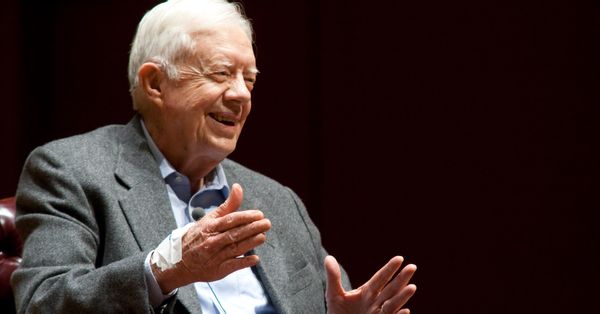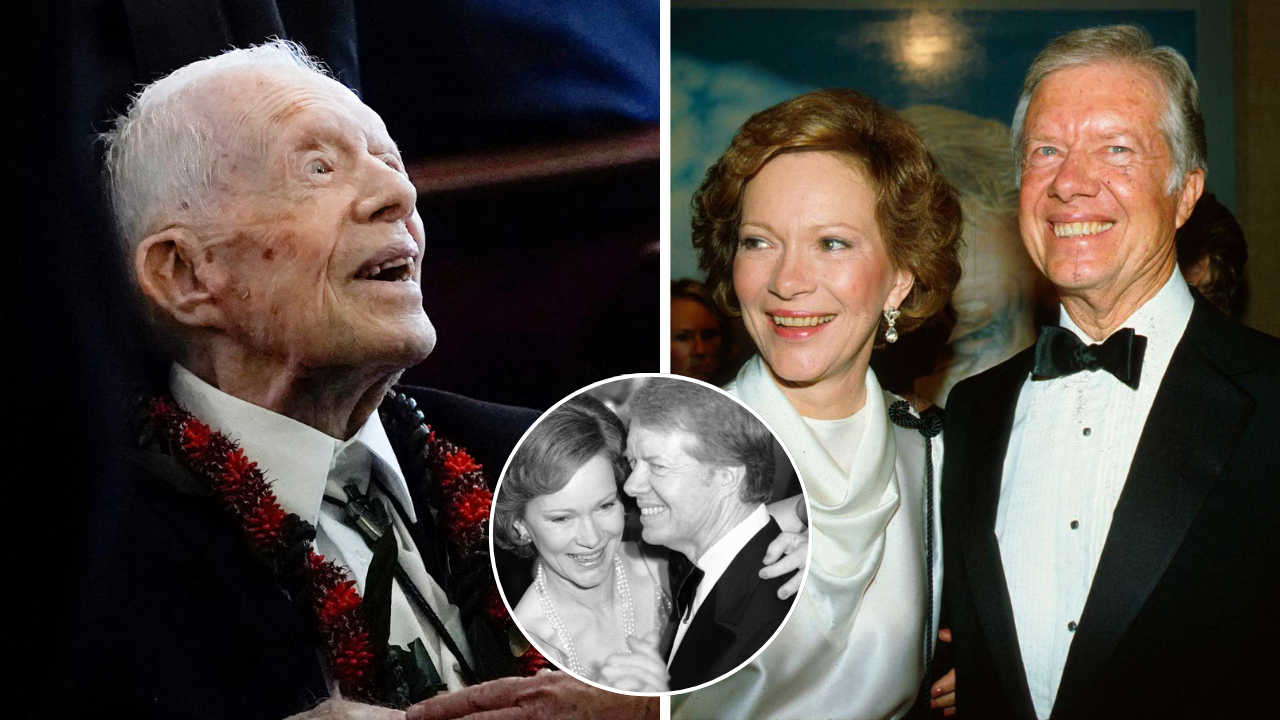President Carter spent nearly two years in hospice care as the nation said their goodbyes, making a final public appearance in November 2023 to mourn his late wife Rosalynn

Jimmy Carter, the Nobel Peace Prize-winning 39th president of the United States who transformed his legacy from one-term commander-in-chief to beloved humanitarian, died on Sunday, Dec. 29 at the record-breaking age of 100.
His son James E. Carter III confirmed that he died at home in Plains, Ga., per The Washington Post. The Carter Center also announced his death in a post on X (formerly Twitter).
Carter’s wife of nearly eight decades, Rosalynn Carter, died 13 months earlier at the age of 96. He made his final public appearance in November 2023 to mourn her death.
:max_bytes(150000):strip_icc():focal(678x403:680x405):format(webp)/Jimmy-Carter-122924-tout-52662d95615547259e0735f0aedaee65.jpg)
Jimmy Carter in 1977. Library of Congress/MCT/Tribune News Service via Getty
Carter is survived by his four children with Rosalynn: Jack, Chip, Jeff and Amy. In March 2019, Carter became the longest-lived American president who also enjoyed the lengthiest post-White House life. His and Rosalynn’s 77-year marriage was the longest of any first couple.
The Carter Center announced in February 2023 that the former president had been moved to hospice care following “a series of short hospital stays,” adding that he “decided to spend his remaining time at home with his family.”

Carter’s longevity in hospice surprised the whole family, his grandson Jason Carter told PEOPLE in September 2023, adding that it had turned into a “real blessing.”
“This is an important part of his faith journey, and it’s one that you don’t get to experience at any other time in your life except for the very end,” Jason said. “And so in that way, I think this has been a really meaningful time for him, and it’s been a really reflective time for him.”
Jason told Southern Living in June that Carter was no longer awake every day, adding that his grandfather was “experiencing the world as best he can as he continues through this process.”
:max_bytes(150000):strip_icc():focal(511x0:513x2):format(webp)/jimmy-carter-1024-1-2f6dcab581de4d18a5327ee44f6a4461.jpg)
Jimmy Carter teaches Sunday school at Maranatha Baptist Church in Plains, Ga., on Aug. 23, 2015. David Goldman/AP Photo
Although President Carter contended with a string of health struggles over the past decade, including a cancer bout in 2015, he remained physically active into his 90s — continuing to help build houses for Habitat for Humanity, attending regular church services and teaching Sunday school.
In August 2015, Carter revealed that he had a small mass removed from his liver, at which time doctors discovered that he had cancer which had spread to other parts of his body.
He faced the diagnosis with his trademark “humor and impatience,” his friend and former White House communications director Gerald Rafshoon told PEOPLE at the time. “Nothing about Jimmy has changed with this diagnosis.”
The cancer was eliminated within four months, and he resumed life as usual.
:max_bytes(150000):strip_icc():focal(979x1046:981x1048):format(webp)/jimmy-rosalynn-carter-12-8ecb5eb298d34a4dafae05303d5a63a5.jpg)
Jimmy and Rosalynn Carter in Plains, Georgia. Matt McClain/The Washington Post via Getty
In July 2017, the former president made headlines again when he collapsed from dehydration while at a Habitat for Humanity work site in Canada — only to return the following morning after the hospital gave him the all-clear.
In October 2019, he was hospitalized after falling and fracturing his pelvis at his home in Plains, Ga. His injury was described in a statement from The Carter Center as “minor.”
The incident marked the third time he had fallen in 2019 and the second time in October. Earlier that month, he received 14 stitches on his head and a black eye after another accident. And in May 2019, he fell at his home and had to undergo surgery on his broken hip.
:max_bytes(150000):strip_icc():focal(999x0:1001x2):format(webp)/jimmy-carter-2-2000-1-62ab6517b7f84b4ab0577a3215a38c97.jpg)
Jimmy Carter volunteers for Habitat for Humanity in Nashville shortly after an October 2019 fall. AFF-USA/Shutterstock
Hours after that first October incident, he went to Nashville with Mrs. Carter to lead their annual build for Habitat. There he helped glue, drill and nail pieces of wood together for corbels as part of a project to build 21 new homes in Nashville’s Park Preserve neighborhood.
“One of the things Jesus taught was: If you have any talents, try to utilize them for the benefit of others,” President Carter told PEOPLE from the Habitat construction site. “That’s what Rosa and I have both tried to do.”

“It’s hard to live until you’re 95 years old,” he told PEOPLE in 2019. “I think the best explanation for that is to marry the best spouse: someone who will take care of you and engage and do things to challenge you and keep you alive and interested in life.”
“I think both mine and Rosa’s minds are almost as good as they used to be, we just have limited capability on stamina and strength,” he added. “But we still try to stay busy and do a good job at what we do.”
:max_bytes(150000):strip_icc():focal(721x0:723x2):format(webp)/jimmy-carter-4-8659362240f64016940b0c0b1a8bd636.jpg)
Library of Congress/MCT/MCT via Getty
Ushered into the White House in 1976 in the wake of Watergate and predecessor President Gerald Ford’s deeply unpopular pardon of disgraced President Richard Nixon, Carter by all accounts had forged a unique path to 1600 Pennsylvania Avenue.
He was a son of the Deep South who became a nuclear scientist and Navy submariner, then a peanut farmer and community organizer, and then the desegregationist governor of his home state of Georgia, whose segregationist groups still held great sway at the polls. After defeating then-President Ford in the 1976 presidential election, the Democrat became the first Deep South president since before the Civil War.

Carter’s time in the nation’s highest office was marked by economic uncertainty, rising gas prices, political upheavals, racial tensions and increasing evidence of America’s waning power overseas.
Though he negotiated a lasting peace treaty between Egypt and Israel and reestablished full formal diplomatic relations with China, his popularity plummeted as he made a series of clumsy public relations gaffes, launched a rescue mission for American hostages in Iran that ended in a fiasco and enacted a controversial boycott of the 1980 Moscow Olympics.
He lost reelection to Republican rival Ronald Reagan by a historic landslide in 1980.

After leaving the White House, however, the Carters set the standard for post-presidency activism that successors like the Clintons and Obamas have followed.
He and Rosalynn created The Carter Center to further global peace and human rights, brokered a nuclear-nonproliferation deal with North Korea, acted as an unofficial diplomat on behalf of the U.S. in troubled areas around the world and worked hands-on to build affordable homes for low-income families both in the U.S. and abroad.
In 2002, Carter was awarded the Nobel Peace Prize for his efforts to promote peace, democracy and human rights.
:max_bytes(150000):strip_icc():focal(999x0:1001x2):format(webp)/jimmy-carter-rosalynn-1-2000-43ccc76731af4d72963a725b21b8a6c4.jpg)
From left: Former President Jimmy Carter and former First Lady Rosalynn Carter in September 2018. John Amis/AP/Shutterstock
To those who knew him best as he rose to national prominence, Carter remained the unpretentious peanut farmer who grew up in a tiny Georgia town.
Pennsylvania dairy farmer Wayne Harpster was friends with Carter since their first fishing trip in 1979. They kept in touch over the years, with Carter visiting Harpster nearly every year to go fishing. In 1989, the former president even helped his old fishing buddy build a covered bridge.
“Over those years, nothing changed between him and I. That’s a lot of years,” Harpster told PEOPLE in 2014. “He’s still President Carter to me.”
And President Carter was rarely without his first lady, Rosalynn, whom he fell in love with while attending the U.S. Naval Academy as a young man. Mrs. Carter shared her husband’s lack of pretension, his hardy constitution and his heart.
:max_bytes(150000):strip_icc():focal(764x131:766x133):format(webp)/jimmy-carter-081823-4-6209def166e1451ab62ee5188054374c.jpg)
Rosalynn and Jimmy Carter walk through Plains, Ga., on Feb. 8, 2017. David Goldman/AP
But more than all that, said Harpster, she was Carter’s “fishing buddy … which is deeper.” They were inseparable, traveling the four corners of the globe together not only to monitor elections in emerging democracies, fight disease in forgotten poor villages and build houses for the homeless through Habitat for Humanity — but also to share a tent along some far-flung river where the fishing was good.
Harpster said he was by the couple’s side when they celebrated their 67th wedding anniversary in Russia in July 2013.
“We had a little party at the fishing camp. It was kind of unique to be with somebody who’s been together [for so long]. You could see a lot of contentment between them,” he said. “I’ve never seen two people as close as they are.”

Never miss a story — sign up for PEOPLE’s free daily newsletter to stay up-to-date on the best of what PEOPLE has to offer.
The Carters remained full and equal partners in his post-presidency, even as Harpster said he sensed in his friends the lingering sting of losing the reelection bid.
“Mrs. C. took it harder than the president,” he said. “But I think they both adjusted pretty fast and they started to have so many projects with The Carter Center and [doing] all these good things in Africa … Just keeping themselves busy and looking ahead to what they could do good for the world and people who need help.”
“He has had a very full, wonderful, productive life,” Carter’s cousin Betty Pope told PEOPLE. “He wanted to make sure every day of his life he was able to do what he was charged to do personally — which, he felt, was to try to make peace and improve the world.”



